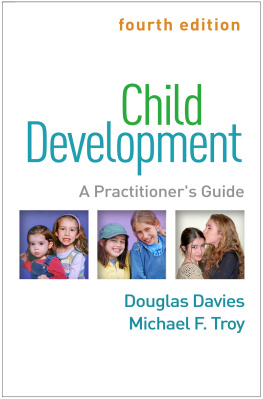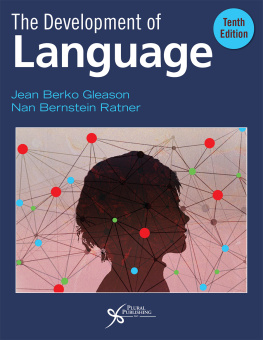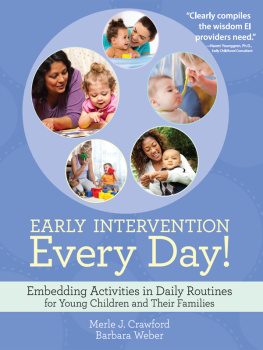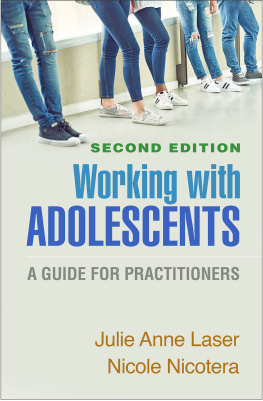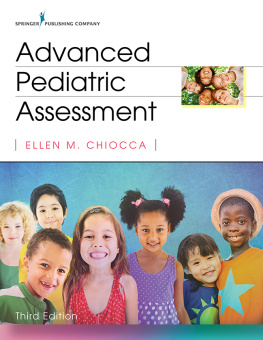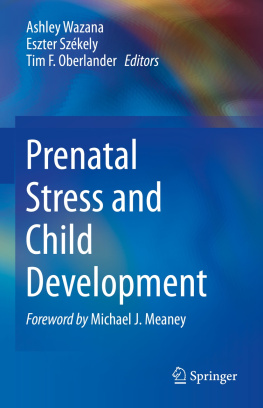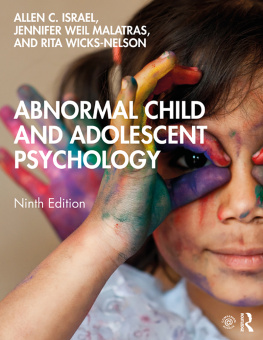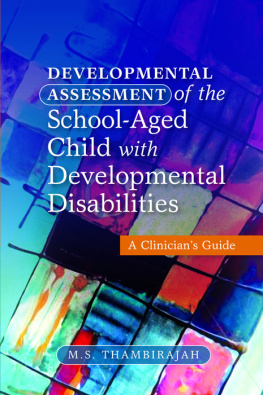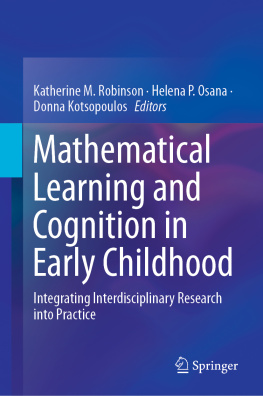Nancy Boyd Webb, Series Editor
This series presents a broad range of topics relevant for todays social workers, psychologists, counselors, and other professionals who work with children, adolescents, and families. Designed for practical use, volumes feature specific discussions on assessment, interventions, therapeutic roadblocks, the therapeutic relationship, and professional and value issues, illuminated by numerous case examples.
Child Development, Fourth Edition: A Practitioners Guide
Douglas Davies and Michael F. Troy
Social Work Practice with Children, Fourth Edition
Nancy Boyd Webb
Play Therapy with Children and Adolescents in Crisis, Fourth Edition
Nancy Boyd Webb, Editor
Group Work with Adolescents, Third Edition: Principles and Practice
Andrew Malekoff
Working with Adolescents: A Guide for Practitioners
Julie Anne Laser and Nicole Nicotera
Helping Bereaved Children, Third Edition: A Handbook for Practitioners
Nancy Boyd Webb, Editor
Social Work in Schools: Principles and Practice
Linda Openshaw
Working with Traumatized Youth in Child Welfare
Nancy Boyd Webb, Editor
Mass Trauma and Violence: Helping Families and Children Cope
Nancy Boyd Webb, Editor
Culturally Competent Practice with Immigrant and Refugee Children and Families
Rowena Fong, Editor
Complex Adoption and Assisted Reproductive Technology: A Developmental Approach to Clinical Practice
Vivian B. Shapiro, Janet R. Shapiro, and Isabel H. Paret
Child Development
A PRACTITIONERS GUIDE
FOURTH EDITION
Douglas Davies
Michael F. Troy
Series Editors Note
by Nancy Boyd Webb
THE GUILFORD PRESS
New York London
Epub Edition ISBN: 9781462543014; Kindle Edition ISBN: 9781462543021
Copyright 2020 The Guilford Press
A Division of Guilford Publications, Inc.
370 Seventh Avenue, Suite 1200, New York, NY 10001
www.guilford.com
All rights reserved
No part of this book may be reproduced, translated, stored in a retrieval system, or transmitted, in any form or by any means, electronic, mechanical, photocopying, microfilming, recording, or otherwise, without written permission from the publisher.
Last digit is print number: 9 8 7 6 5 4 3 2 1
The authors have checked with sources believed to be reliable in their efforts to provide information that is complete and generally in accord with the standards of practice that are accepted at the time of publication. However, in view of the possibility of human error or changes in behavioral, mental health, or medical sciences, neither the authors, nor the editors and publisher, nor any other party who has been involved in the preparation or publication of this work warrants that the information contained herein is in every respect accurate or complete, and they are not responsible for any errors or omissions or the results obtained from the use of such information. Readers are encouraged to confirm the information contained in this book with other sources.
Library of Congress Cataloging-in-Publication Data
Names: Davies, Douglas, 19422015 author. | Troy, Michael F. (Michael Francis), author.
Title: Child development : a practitioners guide / Douglas Davies, Michael F. Troy.
Description: Fourth edition. | New York : The Guilford Press, [2020] | Series: Clinical practice with children, adolescents, and families | Includes bibliographical references and index. |
Identifiers: LCCN 2019044011 | ISBN 9781462542994 (cloth)
Subjects: LCSH: Social work with children. | Child development.
Classification: LCC HV713 .D375 2020 | DDC 155.402/43613dc23
LC record available at https://lccn.loc.gov/2019044011
For Douglas Davies, whose wisdom and insight live on
For Tobi Hanna-Davies, who honored Doug by willing this edition into being
For Cynthia Koehler Troy and her loving, if irrational, patience with me
M. F. T.
Douglas Davies, MSW, PhD, until his death in 2015, was Lecturer at the School of Social Work, University of Michigan. An infant mental health specialist, he published numerous clinical articles on intervention with toddlers and parents, traumatized children, and child cancer survivors. Dr. Daviess most recent practice was devoted to reflective supervision of mental health clinicians and child care consultants, consultation to agencies, and training of clinicians on topics in child development and child therapy. He was inducted into the National Academies of Practice as a distinguished social work practitioner, and received the Selma Fraiberg Award from the Michigan Association for Infant Mental Health.
Michael F. Troy, PhD, LP, is a clinical psychologist at Childrens Minnesota, where he is Medical Director of Behavioral Health Services and Associate Medical Director of Childrens Neuroscience Institute. Dr. Troys clinical and academic interests include diagnostic classification issues in developmental psychopathology, models of therapeutic assessment, psychological assessment of adolescents at risk for major psychopathology, and teaching child clinical psychology as part of hospital and community medical education programs.
The task of reviewing and writing about this book comes with mixed feelings of sadness and pride because of my past professional relationship with Douglas Davies since the publication of the first edition of this book in 1999. It was a pleasure to work with Doug on the first three editions and to hear from professors, students, and practitioners in the United States and abroad how much they valued the wisdom and guidance they found in these books. Doug had been deeply involved in writing this fourth edition prior to his untimely death from congestive heart failure in June 2015, and I feel confident that he would want his writings to continue to provide insights and guidance for practitioners and students for as long as possible. Doug was committed to teaching and consulting with practitioners and students about how to help young children and their families, and his books have been an invaluable resource for this purpose. I am happy that Michael Troy has added his own expertise for this worthy mission.
As I emphasized in the Series Editors Note in the third edition, in 2011, this book on child development provides an essential foundation for all practitioners who work with children. This statement continues to apply to this fourth edition, which, like its predecessors, emphasizes the critical importance of parentchild relationships and the social environment, as well as the childs brain development during his or her early formative years. In addition to its value as a solid reference work, the book is a pleasure to read! Numerous case examples bring the theoretical content to life through illustrations of the delicate balance between risk and resilience factors as these interact with the childs biological reality. In addition, the childs caretaker has a positive or negative influence through interactions that may include either protective or careless, ambivalent, or hostile relationships, often rooted in the caretakers own history. As these details become clear in the text, involvement of the caretaker (usually the parent) in the childs transactional and bidirectional treatment is crucial in influencing the childs future development.
Next page
